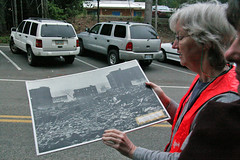 When US military strategists targeted Japanese Civilians (twice) for assault with a nuclear weapon, they committed what was then amongst the very grossest of violations against humanity.
When US military strategists targeted Japanese Civilians (twice) for assault with a nuclear weapon, they committed what was then amongst the very grossest of violations against humanity.Worst of all, historical analysis suggests that the bombs were dropped because of an American (Governmental and Corporate) desire for global military and economic hegemony. The bombs most likely did not substantially promote an expedited surrender - because the Japanese were virtually exhausted militarily prior to the bombing. It seems that it was an American quest for dominance and conquest which led to the nuclear annihilation of such a large number of people.
go to original
By Robert Scheer
During a week of mayhem in Iraq, in which terrorists have rightly been condemned for targeting schoolchildren, it is sobering to recall that this week is also the 62nd anniversary of a U.S. attack that deliberately took the lives of thousands of children on their way to school in the Japanese cities of Hiroshima and Nagasaki. As noted in the Strategic Bombing Survey conducted at President Harry Truman’s request, when the bomb hit Hiroshima on April 6, 1945, “nearly all the school children ... were at work in the open,” to be exploded, irradiated or incinerated in the perfect firestorm that the planners back at the University of California-run Los Alamos lab had envisioned for the bomb’s maximum psychological impact.
The terror plot worked all too well, as Hiroshima’s Mayor Tadatoshi Akiba recalled this week: “That fateful summer, 8:15 a.m. The roar of a B-29 breaks the morning calm. A parachute opens in the blue sky. Then suddenly, a flash, an enormous blast—silence—hell on Earth. The eyes of young girls watching the parachute were melted. Their faces became giant charred blisters. The skin of people seeking help dangled from their fingernails. ... Others died when their eyeballs and internal organs burst from their bodies—Hiroshima was a hell where those who somehow survived envied the dead.”
Like most of the others killed by the two American bombs, neither the children nor the adults had any role in Japan’s decision to go to war, but they were picked as the target instead of an isolated but fortified military base whose antiaircraft fire posed a higher risk. The target preferred by U.S. atomic scientists—a patch in the ocean or unpopulated terrain—was rejected, because the effect of hundreds of thousands of civilians dying would be all the more dramatic.
...
Just exactly what distinguishes the United States’ use of the ever-so-cutely-named “Fat Man” and “Little Boy” atomic bombs on cities in Japan from the car bombs of Baghdad or the planes that smashed into the World Trade Center? To even raise the question, as was found in one recent university case, can be a career-ending move.
Of course, we had our justifications, as terrorists always do. Truman defended his decision to drop the atomic bombs on civilians over the objection of leading atomic scientists on the grounds that it was a necessary military action to save lives by forcing a quick Japanese surrender. He insisted on that imperative despite the objections of top military figures, including Gen. Dwight Eisenhower, who contended that the war would end quickly without dropping the bomb.
The subsequent release of formerly secret documents makes a hash of Truman’s rationalization. His White House was fully informed that the Japanese were on the verge of collapse, and their surrender was made all the more likely by the Soviets’ imminent entry into the fight.
...
No comments:
Post a Comment